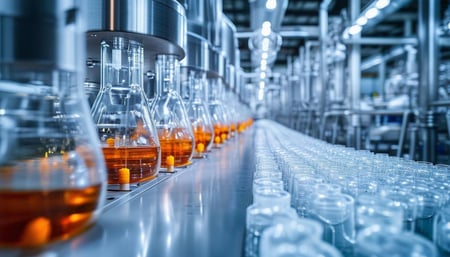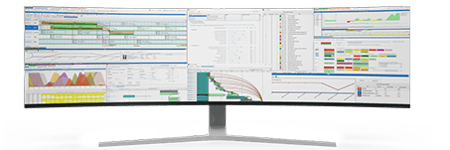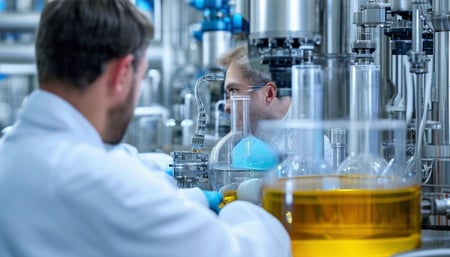Automation Gives Chemical Supply Chains a Competitive Edge
The pressure to improve efficiency and stay competitive is constant in chemical manufacturing. With demands for quicker production cycles, tighter regulations, and an increased focus on sustainability, companies are pushed to adapt their supply chain operations. The answer? Automation. But this doesn’t mean just any automation—it means integrating systems like PlanetTogether with enterprise resource planning (ERP) tools such as SAP, Oracle, Microsoft, Kinaxis, and Aveva to build a seamless and responsive supply chain. By optimizing the flow of information, materials, and production, these integrations are setting the stage for a competitive advantage.
In this blog, we’ll discuss how integrating PlanetTogether with these ERP solutions can help supply chain managers in chemical manufacturing to automate operations, optimize resources, and meet strategic objectives.

Automation in Supply Chain Management
Automation in the supply chain aims to streamline workflows, reduce manual intervention, and improve decision-making processes. For the chemical industry, which often deals with complex regulatory compliance, hazardous materials, and intricate production processes, the benefits of automation are magnified.
Key Benefits of Automation in the Supply Chain
Efficiency: Automation reduces the need for manual data entry and repetitive tasks, speeding up processes across the supply chain.
Cost Reduction: By optimizing inventory and minimizing waste, automation leads to significant cost savings.
Improved Accuracy: Automated systems reduce human error, leading to more reliable data.
Better Decision-Making: Access to real-time data enables quick, data-driven decisions, crucial in a dynamic market.
In chemical manufacturing, automation goes beyond robotics; it involves sophisticated software integrations that enable smooth information flow across systems. For supply chain managers, this means less time spent on coordination and more time focused on strategic initiatives.
![]()

The Power of Integrating PlanetTogether with ERP Systems
PlanetTogether is a powerful production scheduling and planning tool that helps manage complex manufacturing environments. When integrated with ERP systems like SAP, Oracle, Microsoft, Kinaxis, and Aveva, it becomes even more valuable, transforming a company’s supply chain from a reactive entity to a proactive, responsive operation.
Here’s how each integration adds value to the automation process:
SAP Integration: SAP’s ERP is one of the most comprehensive on the market, offering modules tailored for the chemical industry. Integrating PlanetTogether with SAP enables real-time data exchange between production planning and other departments, such as procurement and sales. This tight alignment ensures that inventory levels are optimized based on accurate production forecasts, and changes in production schedules are immediately reflected across the supply chain.
Oracle Integration: Oracle’s ERP suite offers powerful analytics and insights, making it a natural fit for companies looking to automate. Integration with PlanetTogether allows supply chain managers to access real-time production data and align it with supply chain and financial data in Oracle. This integration streamlines the procurement of raw materials, synchronizes inventory levels, and keeps costs under control, which is critical for remaining competitive.
Microsoft Integration: Microsoft Dynamics provides flexibility and scalability, especially valuable for chemical companies dealing with fluctuating market demands. Integrating PlanetTogether with Microsoft Dynamics allows for seamless communication between production and supply chain, automating tasks such as inventory management, material requirement planning, and order tracking. The result is a transparent and agile supply chain.
Kinaxis Integration: Kinaxis is known for its robust supply chain planning and monitoring capabilities. Integrating PlanetTogether with Kinaxis gives chemical manufacturers end-to-end visibility over their supply chain, from raw material suppliers to finished goods. This setup enables predictive analytics and demand forecasting, automating responses to supply chain disruptions and keeping production aligned with demand fluctuations.
Aveva Integration: Aveva focuses heavily on process optimization, which is particularly important in the chemical industry. Integrating PlanetTogether with Aveva means that production planning can be fully aligned with process control, reducing downtime and ensuring consistent product quality. By connecting real-time production data with broader supply chain operations, supply chain managers can respond swiftly to any production anomalies or quality issues.

Automating Core Supply Chain Operations: Key Areas of Focus
Integrating PlanetTogether with ERP systems offers countless opportunities for automating specific areas of the supply chain. Let’s delve into three core areas where this automation brings the most significant advantage.
Inventory Management
In chemical manufacturing, inventory accuracy is crucial due to the hazardous nature of many raw materials. Overstocks and stockouts are costly and can lead to compliance issues. By integrating PlanetTogether with an ERP system, inventory levels can be automatically adjusted based on production schedules and demand forecasts.
For example, when an unexpected spike in demand occurs, the integration ensures that the system automatically adjusts purchase orders, production schedules, and replenishment plans. This prevents shortages and delays, making the supply chain more resilient.
Demand Forecasting and Planning
Automated demand forecasting is essential in chemical manufacturing, where demand can vary widely based on factors such as seasonality and regulation changes. PlanetTogether, combined with ERPs like SAP or Kinaxis, uses real-time data to create more accurate demand forecasts. This data can then drive automated scheduling and production adjustments, ensuring that chemical plants produce just enough to meet demand without excessive inventory buildup.
Moreover, with machine learning capabilities in ERP solutions, this setup can even anticipate market changes based on historical data, enabling proactive responses to shifts in demand.
Supplier Collaboration and Order Processing
Chemical manufacturing depends on a reliable supplier network to ensure uninterrupted production. When integrated with ERP systems, PlanetTogether enables automated order processing, creating seamless communication between suppliers and production teams. For instance, when production schedules change, the system can automatically update purchase orders and notify suppliers of new delivery timelines.
This automation reduces lead times, improves supplier relationships, and decreases the risk of disruptions. Integration also helps identify and qualify secondary suppliers when issues arise, providing an additional layer of supply chain resilience.

The Competitive Advantage of Automated Workflows
With these automations in place, supply chain managers in chemical manufacturing can drive competitive advantages that go beyond cost reduction. Here’s how automation translates into strategic wins:
Enhanced Responsiveness to Market Changes
By automating and integrating production schedules with demand planning, chemical companies can respond to market changes more quickly. Whether it’s a regulatory shift, a raw material shortage, or an unexpected demand spike, an integrated and automated system ensures production can adapt accordingly.
Improved Compliance and Traceability
Compliance is critical in chemical manufacturing due to the industry’s stringent regulatory environment. Automated data capture and real-time tracking across the supply chain ensure that records are accurate and up-to-date. This visibility not only aids in meeting regulatory requirements but also builds trust with customers who demand transparency.
Greater Sustainability and Waste Reduction
Automation allows for leaner production processes, reducing excess inventory and minimizing waste. Integrating PlanetTogether with ERP systems means companies can optimize their raw material usage, energy consumption, and waste management processes, contributing to a more sustainable operation.
Cost Savings through Streamlined Operations
Every aspect of the supply chain, from inventory management to supplier collaboration, can be optimized through automation. By reducing manual tasks, minimizing errors, and streamlining operations, chemical manufacturers can achieve significant cost savings. These savings can be reinvested into further technological advancements, enhancing the company’s competitive position.
Overcoming Implementation Challenges
While the benefits of automating supply chain operations are clear, implementing these solutions comes with its own set of challenges, especially when integrating multiple systems. Supply chain managers need to consider factors such as:
System Compatibility: Ensuring that PlanetTogether can seamlessly integrate with the existing ERP system.
Data Security: With increased data flow between systems, robust cybersecurity measures are necessary to protect sensitive information.
Employee Training: Employees need to be adequately trained on the new system to fully leverage its capabilities.
Scalability: As the business grows, the integrated system must be able to handle increased data loads and additional functionalities.
Careful planning and a phased approach to implementation can help mitigate these challenges. Partnering with experienced vendors and consultants can also smooth out the process, ensuring that the automation strategy is aligned with business goals.
For supply chain managers in chemical manufacturing, automating operations through the integration of PlanetTogether with ERP systems like SAP, Oracle, Microsoft, Kinaxis, and Aveva presents an unparalleled opportunity. By embracing automation, companies can build more responsive, resilient, and sustainable supply chains. The enhanced efficiency, cost savings, and competitive edge gained through this approach position chemical manufacturers for long-term success in a rapidly evolving market.
Whether you're looking to improve forecasting accuracy, enhance supplier collaboration, or simply reduce manual tasks, the integration of these powerful tools can unlock a new level of performance. Now is the time to seize the automation opportunity and leverage these tools to transform your supply chain for the future.
Are you ready to take your manufacturing operations to the next level? Contact us today to learn more about how PlanetTogether can help you achieve your goals and drive success in your industry.
Topics: PlanetTogether Software, Better Decision-Making, Integrating PlanetTogether, Improved Compliance and Traceability, Improved Accuracy, Better Inventory Management, Demand Forecasting and Planning, Chemical Manufacturing, Enhanced Responsiveness to Market Changes, Supplier Collaboration and Order Processing, Cost Savings through Streamlined Operations




















LEAVE A COMMENT